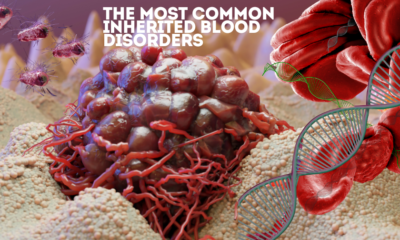Mental Health
Mental Health Awareness: Why It’s More Important Than Ever and How You Can Help

Mental health has always been a crucial aspect of overall well-being, yet it has historically been sidelined, stigmatized, and inadequately addressed. However, the importance of mental health awareness has reached a critical peak. This article delves into why mental health awareness is more important than ever and how individuals, communities, and organizations can contribute to this growing movement.
Post-Pandemic Impact: The Lingering Effects of COVID-19
The COVID-19 pandemic, which began in 2019, has had profound and long-lasting impacts on global mental health. The pandemic’s immediate aftermath saw a surge in anxiety, depression, and other mental health disorders, fueled by fear, uncertainty, and the isolation of lockdowns. Even as the world gradually returns to a semblance of normalcy, the psychological scars of the pandemic linger.
Many people are experiencing what experts refer to as “pandemic fatigue”—a sense of exhaustion and helplessness stemming from prolonged stress and disruption. This has led to a significant increase in mental health issues, including anxiety, depression, and post-traumatic stress disorder (PTSD). The pandemic also exacerbated existing mental health conditions for those who were already vulnerable, making it clear that mental health awareness and support are critical in the ongoing recovery process.
Moreover, the pandemic highlighted and intensified disparities in mental health care access. Vulnerable populations, including frontline workers, low-income families, and people of color, have borne the brunt of these challenges. As we move further into 2024, addressing these disparities and providing equitable mental health support remains a priority.
Rising Mental Health Issues: A Global Concern
Global statistics reveal a sharp rise in mental health issues, underscoring the urgency of mental health awareness. According to the World Health Organization (WHO), depression is now the leading cause of disability worldwide, affecting over 300 million people. Anxiety disorders, similarly, affect a significant portion of the population, with women and young people being particularly vulnerable.
The alarming rise in suicide rates is another stark reminder of the mental health crisis. Suicide is now one of the leading causes of death among young people aged 15-29, with many cases linked to untreated or inadequately treated mental health conditions. This tragic loss of life highlights the critical need for early intervention, increased awareness, and accessible mental health services.
The stigma associated with mental health continues to be a barrier to seeking help. Many individuals struggle in silence, fearing judgment or discrimination. Reducing this stigma through education, advocacy, and open conversations is more important than ever. Mental health awareness campaigns play a crucial role in encouraging people to seek help and fostering a supportive environment where mental health issues are treated with the same seriousness as physical health conditions.
Economic Pressures: The Strain on Mental Health
The global economy has faced significant challenges in recent years, with economic instability and job insecurity becoming pervasive issues. These economic pressures have had a profound impact on mental health, contributing to increased stress, anxiety, and depression among workers and families.
Job insecurity, in particular, has been a major stressor. The fear of losing one’s job, coupled with the reality of unemployment for many, has led to financial strain, decreased quality of life, and a loss of purpose—all of which can exacerbate mental health issues. For those who remain employed, the pressure to perform and the fear of redundancy can create a toxic work environment, leading to burnout and other mental health concerns.
The link between economic pressures and mental health is undeniable. As such, it is crucial to address these issues not only through economic policies that promote stability and job security but also by providing mental health support to those affected by economic hardships. Employers, too, have a role to play by fostering workplace environments that prioritize mental well-being and support employees through difficult times.
Social Media and Mental Health: Navigating the Digital Landscape
Social media has become an integral part of modern life, influencing how we communicate, socialize, and perceive the world around us. While social media platforms offer many benefits, such as connecting with others and accessing information, they also pose significant risks to mental health, especially among young people.
The constant exposure to idealized images and lifestyles on social media can negatively impact self-esteem and body image. Many users, particularly adolescents and young adults, compare themselves to the often unattainable standards presented online, leading to feelings of inadequacy, anxiety, and depression. The phenomenon of “social media envy” is real and can contribute to a distorted sense of self-worth.
Cyberbullying is another critical issue linked to social media use. The anonymity and reach of online platforms can embolden individuals to engage in harmful behavior, leading to significant emotional distress for victims. The 24/7 nature of social media means that cyberbullying can be relentless, with no escape for those targeted.
Promoting mental health awareness involves educating users, particularly young people, about the potential dangers of social media. Encouraging responsible use, setting boundaries, and promoting digital literacy are essential steps in mitigating the negative impact of social media on mental health.
Climate Anxiety: The Psychological Toll of Environmental Concerns
Climate change is not only an environmental crisis but also a growing mental health concern. The increasing frequency and severity of natural disasters, coupled with the long-term implications of climate change, have led to a rise in “climate anxiety”—a term used to describe the fear and stress associated with environmental degradation.
For many, the existential threat posed by climate change can lead to feelings of helplessness, despair, and even guilt. Young people, in particular, are deeply affected, as they grapple with the uncertainty of their future in a world facing significant environmental challenges. This anxiety is further exacerbated by the perception that those in power are not doing enough to address the crisis.
Climate anxiety underscores the need for mental health awareness and support in addressing the psychological impact of environmental concerns. Providing platforms for people to discuss their fears, promoting environmental activism as a form of empowerment, and integrating climate-related stress into mental health care are all crucial steps in addressing this emerging issue.
Access to Mental Health Services: Bridging the Gap
Despite the growing need for mental health services, access remains a significant barrier in many regions. In low- and middle-income countries, mental health care is often underfunded and understaffed, leaving millions without the support they need. Even in high-income countries, access to mental health services can be limited by cost, insurance coverage, and geographic location.
The pandemic exacerbated these challenges, with many mental health services overwhelmed by the sudden increase in demand. Telehealth emerged as a valuable tool during this time, providing remote access to mental health care. However, not everyone has access to the necessary technology or stable internet connections, particularly in rural or underserved areas.
Addressing the gap in mental health services is more important than ever. This involves advocating for increased funding, expanding telehealth services, and ensuring that mental health care is affordable and accessible to all. Governments, non-governmental organizations, and the private sector must work together to bridge this gap and ensure that no one is left without the mental health support they need.
Stigma Reduction: Breaking Down Barriers
Stigma remains one of the most significant barriers to mental health care. Despite increased awareness, many people still view mental health issues as a sign of weakness or moral failing, leading to discrimination and isolation for those affected. This stigma is particularly pronounced in marginalized communities, where mental health issues are often compounded by other forms of discrimination, such as racism, sexism, and homophobia.
Reducing mental health stigma is a critical component of promoting mental health awareness. Education is key to challenging misconceptions and changing attitudes. By providing accurate information about mental health conditions, their causes, and their treatments, we can dispel myths and foster a more compassionate understanding of mental health.
Public figures and influencers also play a crucial role in stigma reduction. When celebrities, athletes, and other prominent individuals speak openly about their own mental health struggles, they help normalize these conversations and encourage others to seek help. Media portrayals of mental health issues must also be responsible, avoiding sensationalism and stereotypes that perpetuate stigma.
Workplace Mental Health: The Role of Employers
As economic pressures and job insecurity rise, the role of employers in supporting mental health has become increasingly important. Workplace mental health is not only about providing support for those with existing mental health conditions but also about creating an environment that promotes overall well-being and prevents mental health issues from arising.
More companies are recognizing the importance of mental health in the workplace. Initiatives such as flexible work hours, mental health days, and employee assistance programs (EAPs) are becoming more common. These programs provide employees with access to counseling, stress management resources, and other forms of support.
However, there is still a long way to go in creating truly supportive work environments. Many workplaces continue to prioritize productivity over well-being, leading to burnout and disengagement. Employers must take a proactive approach to mental health, integrating it into their corporate culture and ensuring that all employees feel valued and supported.
Impact on Youth: A Growing Concern
The mental health of children and adolescents is a growing concern. Young people face unique challenges, including academic pressure, social media influence, and the uncertainty of their future in a rapidly changing world. These stressors have contributed to a rise in mental health issues among youth, including anxiety, depression, and behavioral disorders.
The pandemic further exacerbated these challenges, with many young people experiencing isolation, disrupted education, and increased family stress. The long-term impact of these disruptions on their mental health is still unfolding, but early signs indicate that the effects could be profound.
Addressing the mental health needs of young people requires a multi-faceted approach. Schools play a crucial role in providing mental health education, early intervention, and access to counseling services. Parents and caregivers must also be equipped with the knowledge and resources to support their children’s mental health. Additionally, society as a whole must work to reduce the pressures on young people, promoting a more balanced and supportive environment for their development.
Intersectionality and Mental Health: A Complex Reality
Mental health issues do not exist in a vacuum; they intersect with other forms of discrimination and inequality. Intersectionality—the idea that different forms of oppression and identity (such as race, gender, sexual orientation, and class) overlap and impact one another—plays a significant role in mental health.
For example, people of color often face systemic racism that can contribute to or exacerbate mental health issues. LGBTQ+ individuals may experience discrimination and rejection, leading to higher rates of depression and anxiety. Women, particularly those in marginalized communities, may face a combination of sexism, racism, and economic inequality, all of which can negatively impact mental health.
Promoting mental health awareness requires a nuanced approach that acknowledges and addresses these intersections. Mental health care must be culturally competent, taking into account the unique experiences and challenges faced by different communities. Advocacy efforts must also consider the broader social and economic factors that contribute to mental health disparities.
Educate Yourself and Others: Knowledge is Power
One of the most effective ways to promote mental health awareness is through education. By learning about mental health conditions, their symptoms, and their treatments, individuals can better understand their own mental health and support those around them. Education also plays a crucial role in reducing stigma, as it challenges misconceptions and promotes a more accurate understanding of mental health.
There are numerous resources available to help individuals educate themselves about mental health. Online courses, webinars, and workshops offer accessible ways to learn about mental health issues. Books, documentaries, and podcasts also provide valuable insights into the experiences of those living with mental health conditions.
Sharing this knowledge with others is equally important. By discussing mental health openly and honestly, individuals can help create a culture where mental health is prioritized and supported. Whether it’s talking to a friend, speaking out on social media, or participating in community events, every conversation about mental health contributes to greater awareness and understanding.
Advocate for Policy Change: The Power of Advocacy
Policy change is a crucial component of promoting mental health awareness and improving mental health care. There is a growing recognition of the need for policies that address the mental health crisis and ensure that everyone has access to the care they need.
Advocacy efforts can take many forms, from lobbying government officials to supporting mental health organizations that work to influence policy. Key areas of focus include increasing funding for mental health services, improving access to care, and protecting the rights of those with mental health conditions.
In addition to national and regional advocacy, international efforts are also important. Mental health is a global issue, and collaboration between countries is essential for addressing the challenges we face. Organizations like the WHO and the United Nations play a crucial role in promoting global mental health initiatives and ensuring that mental health is included in broader public health strategies.
Promote Workplace Well-being: Creating Supportive Environments
As discussed earlier, the workplace plays a significant role in mental health. Promoting workplace well-being involves more than just providing mental health resources; it requires creating an environment where employees feel valued, supported, and empowered to take care of their mental health.
There are several ways that employers can promote workplace well-being. This includes offering flexible work arrangements, such as remote work or flexible hours, which can help employees manage stress and maintain a healthy work-life balance. Providing access to mental health resources, such as counseling services and stress management programs, is also crucial.
Additionally, fostering a positive work culture that prioritizes mental health is essential. This involves promoting open communication, encouraging employees to take breaks and use their vacation time, and addressing issues like burnout and work-related stress. When employees feel that their mental health is valued, they are more likely to be engaged, productive, and satisfied in their work.
Support Mental Health Organizations: Making a Difference
Mental health organizations play a vital role in providing support, raising awareness, and advocating for policy change. These organizations offer a range of services, from counseling and crisis intervention to education and advocacy. Supporting these organizations, whether through donations, volunteering, or participating in their events, is a powerful way to contribute to the mental health movement.
There are many organizations working to improve mental health care and raise awareness. Some focus on specific issues, such as suicide prevention, while others provide broad support for all mental health conditions. Many organizations also work to address the mental health needs of specific populations, such as veterans, LGBTQ+ individuals, or people of color.
Supporting mental health organizations can also involve advocating for their work and raising awareness of their services in your community. By promoting the work of these organizations, you can help ensure that more people have access to the support they need.
Use Social Media Responsibly: Harnessing the Power of Digital Platforms
Social media has the potential to be a powerful tool for promoting mental health awareness, but it must be used responsibly. With the pervasive influence of social media, it is essential to share accurate information about mental health, promote positive messaging, and challenge stigma.
Using social media to raise awareness about mental health issues can involve sharing educational content, highlighting personal stories, and promoting the work of mental health organizations. It is also important to engage in discussions about mental health in a respectful and supportive manner, avoiding harmful language or stigmatizing comments.
Social media can also be used to challenge misconceptions about mental health and promote a more informed understanding of mental health issues. By correcting myths and sharing accurate information, individuals can help foster a more supportive and compassionate online community.
Foster Open Conversations: Breaking the Silence
Open conversations about mental health are essential for reducing stigma and promoting awareness. Fostering safe spaces where people can talk about their mental health experiences without judgment is more important than ever.
Creating these spaces can involve initiating conversations with friends, family, and colleagues about mental health, encouraging others to share their experiences, and offering support to those who may be struggling. It is also important to listen actively and empathetically, validating the experiences of others and avoiding judgment or criticism.
Open conversations can also take place in more formal settings, such as support groups, workshops, or community events. These spaces provide opportunities for individuals to connect with others who may be experiencing similar challenges and to learn from each other’s experiences.
Practice Self-Care: Prioritizing Your Own Mental Health
Taking care of your own mental health is a crucial part of promoting mental health awareness. Self-care involves more than just relaxation or indulgence; it is about taking proactive steps to maintain your mental well-being and seek help when needed.
Self-care can take many forms, from practicing mindfulness and meditation to engaging in regular physical activity or pursuing hobbies that bring you joy. It also involves setting boundaries, managing stress, and seeking professional help if you are struggling with your mental health.
Prioritizing self-care not only benefits your own mental health but also sets a positive example for others. When you take care of yourself, you are better equipped to support those around you and contribute to a culture that values mental health.
Be a Mental Health Ally: Supporting Others
Being a mental health ally means standing by those who are struggling with mental health issues, offering support, and encouraging them to seek help. With the growing mental health crisis, the role of allies is more important than ever.
As an ally, you can offer support in many ways. This can include listening without judgment, providing practical help, or simply being there for someone who is struggling. Encouraging others to seek professional help and offering to accompany them to appointments can also be invaluable.
Being a mental health ally also involves challenging stigma and advocating for those with mental health conditions. This can involve speaking out against discrimination, promoting mental health awareness, and supporting policies that improve mental health care.
Participate in Awareness Campaigns: Raising Your Voice
Awareness campaigns are a powerful way to promote mental health awareness and engage your community in the conversation. There are many opportunities to participate in mental health awareness campaigns, whether at the local, national, or global level.
Participating in awareness campaigns can involve organizing events, such as Mental Health Awareness Month activities, fundraising for mental health organizations, or simply sharing information and resources on social media. These campaigns help raise awareness, reduce stigma, and promote understanding of mental health issues.
In addition to participating in existing campaigns, you can also create your own awareness initiatives. This can involve starting a mental health club or support group in your community, organizing educational workshops, or advocating for mental health policies in your local government.
Challenge Misconceptions: Promoting Accurate Understanding
Finally, challenging misconceptions about mental health is a crucial part of promoting awareness. With the ongoing mental health crisis, it is more important than ever to correct myths and misinformation and promote a more accurate understanding of mental health.
Challenging misconceptions can involve speaking out against harmful stereotypes, correcting misinformation in conversations or online, and educating others about the realities of mental health conditions. It is also important to promote a more compassionate understanding of mental health, recognizing that mental health issues are not a sign of weakness or failure but a common and treatable aspect of human experience.
By challenging misconceptions and promoting accurate understanding, you can help create a society that values mental health and supports those who are struggling.
Conclusion
Mental health awareness is more important than ever. The lingering effects of the COVID-19 pandemic, rising mental health issues, economic pressures, social media influence, climate anxiety, and the ongoing challenges of stigma and access to care all underscore the need for increased awareness and support. By educating ourselves and others, advocating for policy change, promoting workplace well-being, supporting mental health organizations, and fostering open conversations, we can all play a role in promoting mental health awareness and creating a more compassionate and supportive society.
-

 Press Release4 days ago
Press Release4 days agoClinical Trials Market Set for Robust Growth, Driven by Drug Development Surge and Digital Innovation
-

 Press Release7 days ago
Press Release7 days agoBellarium ($BEL) Price Prediction: Could It Hit $5 by 2026?
-

 Business6 days ago
Business6 days agoHow Managed IT Solutions Help Small Teams Compete at Enterprise Scale
-

 Press Release5 days ago
Press Release5 days agoIndustrial Boiler Market Expected to Surpass USD 24.4 Billion by 2035 Amid Growing Demand for Energy Efficiency and Industrialization
-

 Press Release5 days ago
Press Release5 days agoGreen Bio Chemicals Market Poised for Sustainable Growth amidst Global Shift to Eco-Friendly Alternatives by 2035
-

 Press Release5 days ago
Press Release5 days agoPreventive Vaccines Market to Witness Strong Growth by 2035
-

 Press Release5 days ago
Press Release5 days agoFill-Finish Pharmaceutical Contract Manufacturing Market Expected to Flourish Amid Biopharmaceutical Boom and Global Outsourcing Trend by 2035
-

 Press Release5 days ago
Press Release5 days agoPet Food Nutraceutical Market Set for Robust Expansion Amid Rising Demand for Pet Wellness by 2035






























